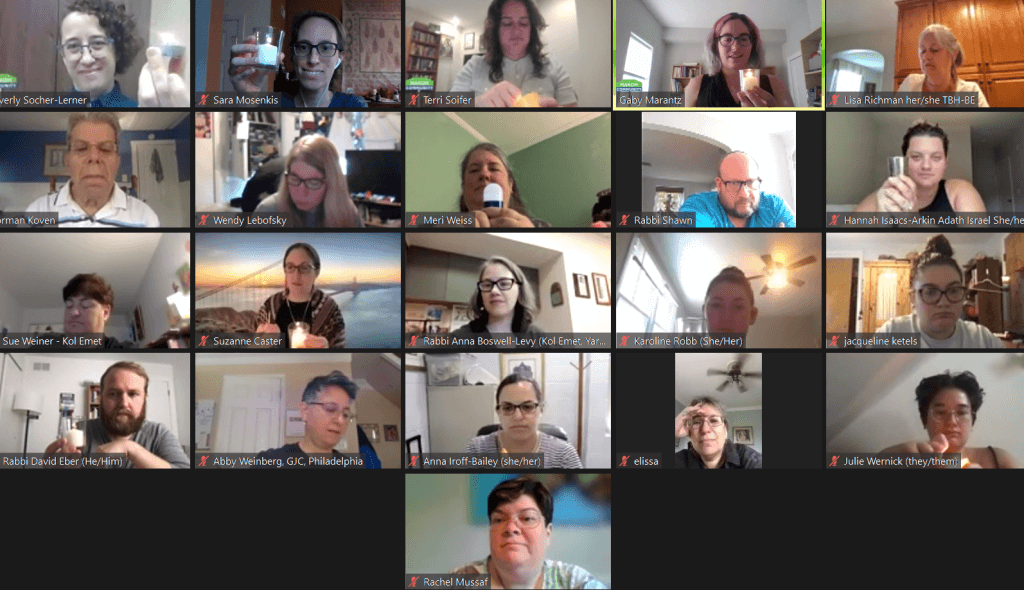What a joy to be back in the virtual room for our 3rd annual Jewish Placemaking Conference! We had 60 directors and educators from across the country register to join us for three packed afternoons of learning and reflecting together.
After brief introductions to Makom Community and the conference facilitation staff, Beverly, Gaby, Terri, and Sara, we jumped right into a group text study experience. This year, we unpacked Moshe’s experience of placemaking during his encounter with God at the burning bush. We framed the first text study with some quiet time to reflect, paint, and/or write about our own hineni moments that snapped us to attention. We then set up the second text study with a children’s book about a pencil who experiences a life altering encounter similar to Moshe’s.

When Moshe first notices the bush, he says to himself “I must turn aside to look at this marvelous sight” (Exodus 3:3). We asked our participants when they have had similar, attention-grabbing experiences:
- Under the huppah (wedding canopy), reciting Eshet Hayil to my bride.
- I was 13, at summer camp, lying under a tree and looking up the trunk at the leaves and the sky; feeling the earth and heaven connected.
- In my synagogue sanctuary; it was my first day as director and I had planned for a moment of leading something singing. It was a truly AWFUL moment.
- Seeing all the kids in my classroom.
- After my daughter made aliyah and joined the IDF, I was visiting her for the moment she got her Israeli passport. It was a moment of knowing that I raised my daughter and I let her go. It was both difficult and awesome.
Next we asked, what does it take to be tuned in to an experience like that? Particularly when we’re being called by the world and people around us non-verbally the way Moshe was, how do we notice? Here are some of the responses people shared:
- Allowing openness to whole experience
- Taking a moment
- Understanding of self and others
- Leaning into or choosing to be present with fear/awe (Moshe could have felt too busy to look at the bush and needing to continue to chase the sheep)
- Put down what’s “productive”
What can we learn from the interaction between Moshe and God at the burning bush about advocating for and meeting our own needs?
- We get to be persistent.
- People can’t help if we don’t tell them.
- We need to speak up and verbalize our feelings, not keep them inside or be embarrassed to reveal how we are feeling.
- Sometimes it’s really hard to ask questions/to be able to know how to put things into words.
- There are layers to needs – once we meet one, there will be another one.
Afterwards, we asked participants to think about the following: What was it like for you to experience text study like that? What did you notice about the choices we made as facilitators?
- Space to interpret the art prompt as Jewish or not.
- We were given opportunities to think and interpret on our own, to maximize the moment.
- Connected to our own experience; also about this moment in the conference.
- I felt supported, listened to, respected, involved.
- It was a really positive group learning experience.
- I felt very stimulated by the opportunity to look at this text anew.
- I appreciated how using that story before the text helped create possibilities around conception of the divine that would be harder to do in the other direction.
In addition to experiencing this taste of Jewish Placemaking, participants in the conference unpacked some of the ins and outs of our pedagogy and process with us. We presented examples of our students demonstrating increased empathy, self-efficacy, joy, and ownership of Jewish tradition. We examined how various strategies including nonviolent communication, social-emotional and spiritual learning and strong relationality help us get there. Additionally, we create curricula and lesson plans from the end backwards help us and the learners understand the purpose of each lesson.
We particularly enjoyed presentations from three alumni of our Accelerator and coaching programs, who shared success stories of their implementation of Jewish Placemaking in their own schools. Abby Weinberg from Germantown Jewish Center shared about her experience writing curriculum for her school during a year of coaching with Beverly. Meri Weiss from Kesher Israel presented on building engagement among her learners through opportunities for them to change their physical space. Suzanne Caster from Beth Tikvah-B’nai Jeshurun demonstrated how she used her classroom brit (two-way promise) to both create expectations from the beginning of the school year and as an intention setter for each class.
After three days together, folks left with new ideas about relating to their students and families, building curricula, and creating opportunities for meaning making and application in their learning environments. They had big questions about where to start and how to make lasting change in their communities. We look forward to continuing to work with all of these fabulous educators and directors and can’t wait to see where they take Jewish Placemaking next!
